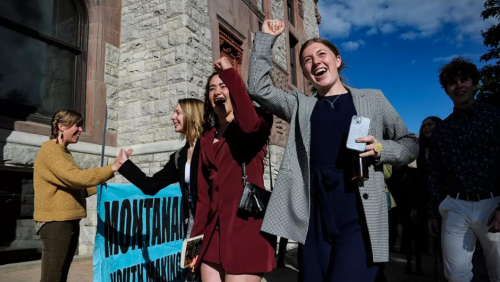What Held v. Montana immediately offers for Constitutional Environmental Rights
November 16, 2023 by Matthew Grabianski

Plaintiffs in Held arrive for the final day of the historic trial. Credit: Thom Bridge, Independent Record via AP
Held v. Montana,[1] decided by Montana state court Judge Kathy Seeley last August, is already widely recognized as a landmark case in environmental law.[2] Much has been written about the ruling, which struck down a Montana provision that forbade state actors from “considering the impacts of greenhouse gas (GHG) emissions or climate change” in analyzing proposed policy.[3] As the first climate litigation to reach trial and the first judicial decision directly tying climate change to Constitutional rights,[4] Held has immediately become a prevalent legal win for climate activists.
Held is primarily important for its recognition of the harms caused by climate change, which can be widely applied in future environmental litigation. Before that future potential is realized, however, the decision may create immediate benefits. Held’s success is rooted in Montana’s Constitution, which ensures citizens a “right to a clean and healthful environment.”[5] Five other states (Hawai’i, Illinois, Pennsylvania, New York, and Massachusetts) already have Constitutional provisions that mirror Montana’s.[6] Three of those are among the top ten carbon dioxide-polluting states.[7] If courts find Held’s logic applicable to those analogous provisions, and potential GHG emissions are restricted, Held can have an impact immediately.
What’s more, Montana’s provision may be more difficult to judicially enforce than its five siblings. By relying on Montanans’ right to a “clean and healthful environment,”[8] Held offered answers to three thorny questions.
First, these Constitutional provisions struggle to overcome the issue of self-execution; whether the right to a healthy environment is enforceable without further action by the state legislature.[9] Held deemed that question unnecessary by finding the policy facially unconstitutional. The court reasoned that the law—one that directly incentivized further GHG pollution—so clearly conflicted with its citizens’ right to a clean and healthful environment that it exceeded the legislature’s authority. Held thus extended environmental advocates a new path around self-execution hurdles.
Second, to have standing in court, environmental plaintiffs often fight to prove that their harm is redressable. Not only does Montana have stricter standing requirements than other states for enforcing environmental Constitutional rights,[10] but this standing requirement is especially difficult to satisfy in a sparsely populated state that contributes only 0.6% of the nation’s carbon dioxide emissions.[11] The court rejected the notion that Montana, the 41st biggest CO2 emitting state, was too irrelevant on the global climate scale to avoid the consequences of its actions; in legal lingo, Montana’s GHG activity was not de minimis.[12] Setting such a baseline lends significant support for parallel actions against the states with similar Constitutional provisions that contribute more to climate change than Montana does.
Third, for almost 40 pages of the 103-page opinion, Held directly and explicitly connected climate change to human health.[13] That simple yet powerful (and surprisingly novel) legal logic is clearly helpful on its face, but is especially immediately helpful in jurisdictions—specifically Illinois[14]—that limit the reach of Constitutionally-enshrined environmental rights to human health impacts.
Held’s verdict has been appealed in still-conservative Montana,[15] but Held’s argumentation remains what a retired Montana Supreme Court Justice called a “slam dunk home run” that has caught the country’s attention.[16] Whatever happens next, Held has already become a beacon of hope, and environmental activists should take advantage of the immediate potential it revealed.
[1] Held v. Montana, No. CDV-2020-307 (1st Dist. Ct. Mont., Aug. 14, 2023). You can read the decision here: https://climatecasechart.com/wp-content/uploads/case-documents/2023/20230814_docket-CDV-2020-307_order.pdf.
[2] E.g., David Gelles and Mike Baker, “Judge Rules in Favor of Youths in a Landmark Climate Case,” THE NEW YORK TIMES, https://www.nytimes.com/2023/08/14/us/montana-youth-climate-ruling.html (Aug. 16, 2023).
[3] Held, No. CDV-2020-307 at 2.
[4] Dharna Noor, Young Montana residents bring climate change case to court for first time ever, THE GUARDIAN (June 12, 2023, 6:00 AM), https://apnews.com/article/montana-youth-climate-change-lawsuit-appeal-3993eb1134982fa9c416eff2ad59b729
[5] Mont. Const. art. II, § 3; Mont. Const. Art. IX, § 2.
[6] Haw. Const. art. XI, § 9; Ill. Const. art. XI, § 2; Mass. Const. art. 97; N.Y. Const. art. I, § 19; Pa. Const. art. I, § 27. For an in-depth comparison of these provisions, see generally JOHN C. DERNBACH, The Environmental Rights Provisions of U.S. State Constitutions: A Comparative Analysis, in WIDENER UNIVERSITY COMMONWEALTH LAW SCHOOL LEGAL STUDIES RESEARCH PAPER SERIES NO. 23-05, https://deliverypdf.ssrn.com/delivery.php?ID=654125087110025096008006080029026076025033067063006028024026073018102085121104106006025011001016026124055021080069108104127091117023037077029097068019098120115086098095052046112070004008114018029094075092120104025005069000079097083095076086126123021021&EXT=pdf&INDEX=TRUE.
[7] U.S. ENERGY INFORMATION ADMINISTRATION, STATE CARBON DIOXIDE EMISSIONS DATA, https://www.eia.gov/environment/emissions/state/.
[8] Mont. Const. art. II, § 3.
[9] DERNBACH, supra note 6, at 4.
[10] Id. at 17.
[11] U.S. ENERGY INFORMATION ADMINISTRATION, supra note 7.
[12] Held, No. CDV-2020-307 at 88.
[13] Id. at 26-64.
[14] Glisson v. City of Marion, 720 N.E.2d 1034 (Ill. 1999); DERNBACH, supra note 6, at 12.
[15] Amy Beth Hanson, Montana is appealing a landmark climate change ruling that favored youth plaintiffs, AP NEWS (Oct. 2, 2023, 2:24 PM), https://apnews.com/article/montana-youth-climate-change-lawsuit-appeal-3993eb1134982fa9c416eff2ad59b729
[16] Micah Drew, Flathead Beacon, and Amanda Eggert, ‘This changes everything’: Experts respond to Held v. Montana climate ruling, MONTANA FREE PRESS (Aug. 17, 2023), https://montanafreepress.org/2023/08/17/this-changes-everything-experts-respond-to-landmark-youth-climate-ruling/

